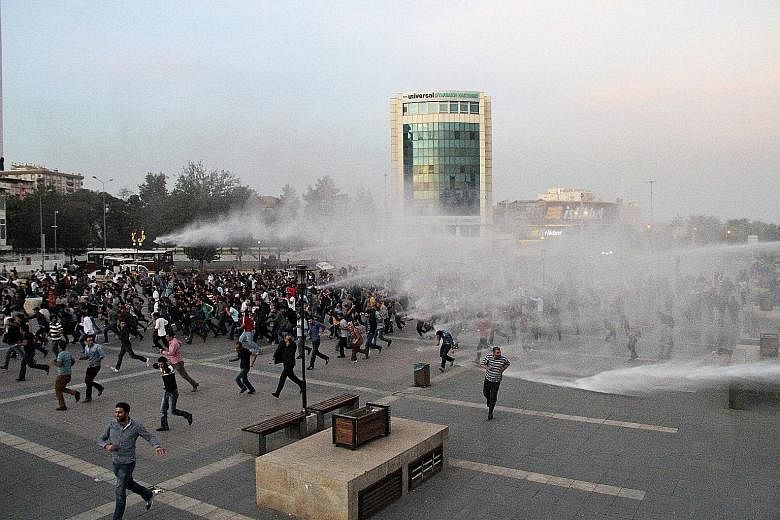ISTANBUL • The deadliest attack in Turkey's recent history came three weeks before elections. From the start, the mourning was mixed with recriminations, as violence threatens to deepen the country's political deadlock.
Turkish Prime Minister Ahmet Davutoglu yesterday vowed that the Nov 1 legislative elections would go ahead, despite the double suicide bombing in Ankara.
The blasts killed 97 people, according to government estimates, although opposition parties said the actual toll was higher, at 128.
"We will hold the elections under whatever circumstances," he told NTV television.
Turks will vote for the second time this year after an inconclusive June ballot roiled markets by failing to produce a majority government.
The tensions that prevented parties from forging a coalition then were on display again in the wake of the bombings, as leaders traded barbs about who is to blame.
"The country is now entrapped in a slow-motion crisis that is becoming increasingly intractable," Teneo Intelligence managing director Wolfango Piccoli wrote in an e-mailed note in London.
President Recep Tayyip Erdogan, who is not up for re-election and is supposed to be above the political fray, called for unity after the attack. However, there was little sign of it among party leaders.
Of the three opposition groups in Parliament, only two were invited to a summit with PM Davutoglu to discuss the emergency on Sunday. One of those leaders refused to attend, while the other, Mr Kemal Kilicdaroglu from the biggest opposition group, held a press conference right after the meeting to pour scorn on the government's handling of the attack.
Mr Kilicdaroglu demanded the resignation of two ministers, and called out an adviser to the President for tweets he said were disrespectful of the public mood.
Mr Selahattin Demirtas, the leader of the pro-Kurdish party whose surge of support deprived Mr Davutoglu's AK Party of its majority in June, was not invited .
Mr Erdogan and Mr Davutoglu have repeatedly accused Mr Demirtas' group of links to the armed Kurdish militants of the PKK or Kurdistan Workers' Party.
The authorities have listed the PKK, which has killed dozens of Turkish soldiers and policemen in recent months, alongside Islamic State in Iraq and Syria (ISIS) as potential suspects for the Ankara attack, even though many of those killed were Kurdish activists.
Turkey carried out air strikes against the PKK within hours of the blasts, and it has been unwilling to support related Kurdish groups in Syria, even as they have won victories against ISIS.
Mr Demirtas had the harshest words for the government. "A state that knows about it when a bird flies through central Ankara wasn't able to prevent a massacre," he said in televised comments. "Partisans of the government have been up all night blaming us and blaming the dead on television. We would have at least have hoped we could come together in our grief."
Mr Davutoglu said he did not invite Mr Demirtas because of his "irresponsible" criticisms of the government.
Another leader, Mr Devlet Bahceli of the nationalist MHP, was invited but refused to attend: His party reportedly told the premier he should be accustomed to rejection.
All these vituperative exchanges do not bode well for the prospects of forming a coalition after the November vote, even though at least some of those leaders may have to make a deal if the country is going to avoid being left in a political vacuum.
Most opinion polls suggest that the outcome will be similar to the June stalemate, with no one winning a majority. The extent of Mr Erdogan's power had been a sticking point for all the parties negotiating with the AKP, which he founded before moving into the presidency.
Mr Erdogan had campaigned alongside the AKP prior to the election, asking for an expansion of his presidential powers, yet voters did not grant that mandate.
BLOOMBERG, AGENCE FRANCE-PRESSE

